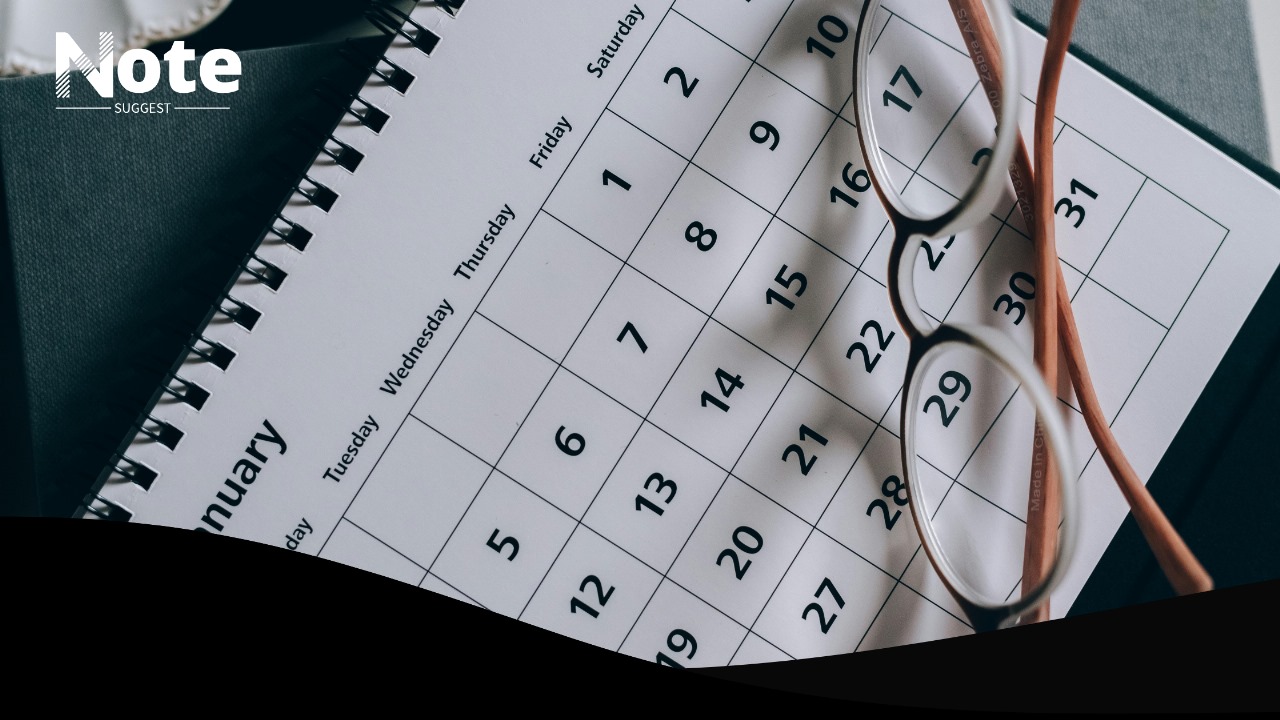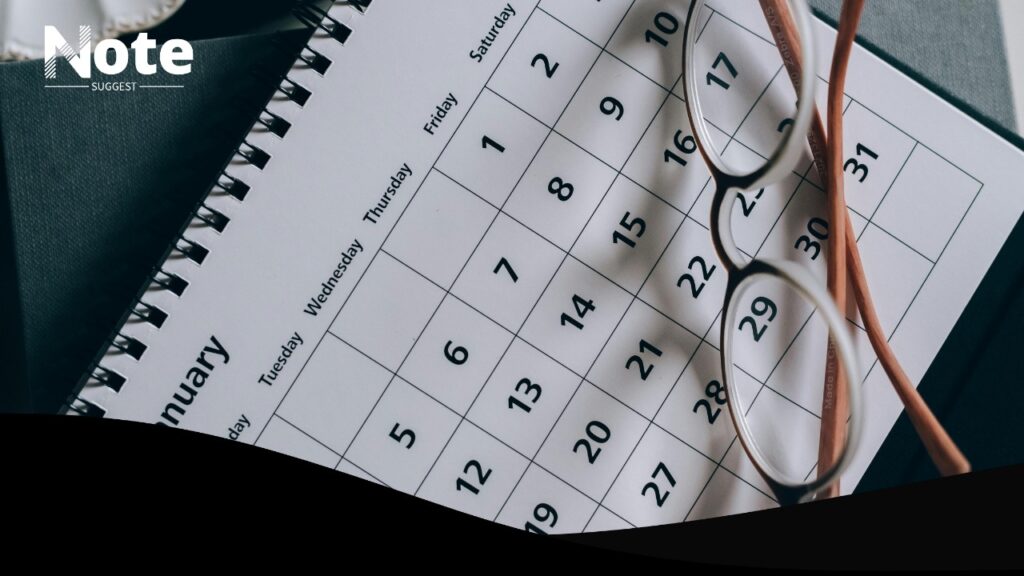
Keeping track of important dates can sometimes be tricky, but choosing the right words can make all the difference. These alternatives not only make your communication more engaging but also ensure that key events—whether formal meetings or casual hangouts—get the attention they deserve. Each phrase comes with examples to illustrate its use, helping you add variety to your reminders and invitations.
From “Save the Date” to “Count Down the Days,” these expressions offer creative and effective ways to keep others informed and excited about upcoming events. Let’s dive in and discover how you can make your messages stand out.
In this article, we’ll uncover 30 unique ways to say “Mark Your Calendars” and explore scenarios where each phrase fits perfectly.
Contents
- 1 Why You Need Synonyms for “Mark Your Calendars” in Both Written and Oral Communication
- 2 What To Say Instead of “Mark Your Calendars”
- 3 Mark Your Calendars: 30 Ways to Remember Important Dates
- 3.1 1. Get ready for this date [Casual]
- 3.2 2. Remember this day [Casual]
- 3.3 3. Lock in this date [Professional]
- 3.4 4. Keep this date in mind [Neutral]
- 3.5 5. Get this on your schedule [Professional]
- 3.6 6. Set this time aside [Neutral]
- 3.7 7. Don’t miss this one [Casual]
- 3.8 8. Schedule this event [Professional]
- 3.9 9. Plan for this date [Professional]
- 3.10 10. Make this a priority [Professional]
- 3.11 11. Save the time [Casual]
- 3.12 12. Add this to your planner [Casual]
- 3.13 13. Hold this time for the event [Professional]
- 3.14 14. Plan accordingly [Professional]
- 3.15 15. Keep your schedule clear for this event [Professional]
- 3.16 16. Save the date (Formal)
- 3.17 17. Circle the date (Casual)
- 3.18 18. Note the date (Neutral)
- 3.19 19. Block off this day (Directive)
- 3.20 20. Keep the day open (Suggestive)
- 3.21 21. Highlight this date (Emphatic)
- 3.22 22. Put this on your agenda (Professional)
- 3.23 23. Reserve this date (Formal)
- 3.24 24. Pencil this in (Informal)
- 3.25 25. Don’t forget this date (Reminder)
- 3.26 26. Mark This Date (Direct)
- 3.27 27. Set a Reminder for This Date (Practical)
- 3.28 28. Save the Day (Optimistic)
- 3.29 29. Don’t Miss Out on This Date (Encouraging)
- 3.30 30. Make a Note of This Date (Informative)
- 3.31 FAQ’S
Why You Need Synonyms for “Mark Your Calendars” in Both Written and Oral Communication
- Enhances Clarity: Using varied expressions makes your reminders easier to understand and ensures they resonate with your audience. Clear communication reduces misunderstandings and emphasizes the importance of your message.
- Improves Engagement: Fresh and dynamic phrases capture attention more effectively. Repeating the same phrase can become dull, but a creative alternative can make your reminders stand out and prompt action.
- Adapts to Context: Different situations require different tones. Whether formal or informal, the right synonym aligns with the occasion, making your message feel appropriate and considerate.
- Builds Rapport: Thoughtful communication fosters stronger connections. Tailoring your language to suit the recipient demonstrates effort and helps build trust and rapport.
- Encourages Action: Unique and specific phrases make it easier for people to prioritize your event. A well-chosen phrase can create urgency and prompt immediate scheduling or planning.
What To Say Instead of “Mark Your Calendars”
- Get ready for this date [Casual]
- Remember this day [Casual]
- Lock in this date [Professional]
- Keep this date in mind [Neutral]
- Get this on your schedule [Professional]
- Set this time aside [Neutral]
- Don’t miss this one [Casual]
- Schedule this event [Professional]
- Plan for this date [Professional]
- Make this a priority [Professional]
- Save the time [Casual]
- Add this to your planner [Casual]
- Hold this time for the event [Professional]
- Plan accordingly [Professional]
- Keep your schedule clear for this event [Professional]
- Save the date (Formal)
- Circle the date (Casual)
- Note the date (Neutral)
- Block off this day (Directive)
- Keep the day open (Suggestive)
- Highlight this date (Emphatic)
- Put this on your agenda (Professional)
- Reserve this date (Formal)
- Pencil this in (Informal)
- Don’t forget this date (Reminder)
- Mark This Date (Direct)
- Set a Reminder for This Date (Practical)
- Save the Day (Optimistic)
- Don’t Miss Out on This Date (Encouraging)
- Make a Note of This Date (Informative)
>> Related Guide: 20 Other Ways to Say “Have a Great Weekend” (With Scenarios)
Mark Your Calendars: 30 Ways to Remember Important Dates
Stay organized by using various methods to remember key dates. These 30 strategies help ensure you never miss an important event.
From reminders to mental notes, marking your calendar keeps you on track year-round. Make sure your schedule stays organized and stress-free.
1. Get ready for this date [Casual]
When you’re anticipating an event, it’s important to mentally prepare for it. Telling someone to “get ready for this date” suggests a sense of excitement and expectation. It’s not just about saving the date, but about gearing up for an important event or milestone.
Scenario: You’re planning a casual hangout with friends at an amusement park, and you tell them, “Get ready for this date!” This gives them a sense of anticipation, and they’ll be more likely to mentally prepare and look forward to it.
2. Remember this day [Casual]
“Remember this day” implies a memorable event that people should hold in mind. It’s often used for occasions that might have special significance, whether it’s a personal gathering or a small event that could become something people reminisce about.
Scenario: You’re hosting a surprise party for a close friend. You might say, “Remember this day,” to highlight how unforgettable the event will be. This informal phrase adds excitement and encourages them to take mental note of the occasion.
3. Lock in this date [Professional]
“Lock in this date” implies that the date is fixed and should be secured in one’s schedule. It’s commonly used in professional settings to ensure that everyone is committed to attending or participating in an event, such as a meeting or a business conference.
Scenario: You’re organizing a corporate retreat for your team. You send out an email saying, “Lock in this date for the team retreat next month.” This communicates that the date is set, and it’s important to prioritize the event on their calendar.
>> Take a look at this informative suggestion: Happy New Year
4. Keep this date in mind [Neutral]
“Keep this date in mind” is a polite and neutral way of reminding someone to remember a particular date without being too pushy. It’s suitable for informal and formal settings, as it allows flexibility for the person receiving the reminder.
Scenario: You’re planning a community volunteer event, and you want to make sure that everyone has the event on their radar. You might say, “Keep this date in mind for our charity event.” This encourages people to be aware of the upcoming event without pressuring them to commit right away.
5. Get this on your schedule [Professional]

“Get this on your schedule” is a professional and efficient way of reminding someone to add an event to their calendar. It’s often used in business communications where scheduling is a key part of planning and coordination.
Scenario: You’re coordinating a series of meetings for a client. In your email, you write, “Please get this on your schedule, as it’s essential to our planning process.” This emphasizes the importance of the meeting and ensures it’s prioritized in their calendar.
6. Set this time aside [Neutral]
“Set this time aside” is often used in professional and neutral settings, indicating that a person should reserve time in their schedule for something important. It suggests that the time is valuable and requires some prioritization.
Scenario: You’re organizing a personal development seminar for your colleagues. You might say, “Set this time aside for the seminar,” ensuring that they understand the significance of the event and that it requires focus and attention.
7. Don’t miss this one [Casual]
“Don’t miss this one” is a casual and engaging way to emphasize the importance of an event. It adds excitement and encourages people to prioritize the event so they don’t miss out on something fun or significant.
Scenario: You’re promoting a live concert with your friends and say, “Don’t miss this one!” This adds a fun, informal tone, emphasizing how enjoyable and important the event will be, making everyone excited to attend.
>> Explore this recommended note: Merry Christmas.
8. Schedule this event [Professional]
“Schedule this event” is a straightforward and professional phrase, typically used to remind someone to allocate time in their calendar for a planned activity. It’s commonly used in business or professional settings to ensure clarity and commitment to specific times.
Scenario: You’re organizing an important training session for your team. You email them saying, “Please schedule this event for the upcoming Tuesday.” This ensures everyone knows to allocate time and prepare for the event ahead of time.
9. Plan for this date [Professional]
“Plan for this date” is a direct and professional way of suggesting that individuals take this specific date into account when managing their time. It encourages proactive scheduling and preparation for an event.
Scenario: You’re coordinating a team project deadline, and you inform your team, “Plan for this date as the final submission deadline.” This is a clear and professional way to ensure everyone understands the importance of meeting that specific date.
10. Make this a priority [Professional]
“Make this a priority” is a phrase used to stress the importance of an event, encouraging individuals to focus their attention and effort on that specific date. It’s typically used in both professional and personal contexts to emphasize the value of attending or being prepared.
Scenario: You’re managing an important company conference and send out a reminder: “Make this a priority—our annual conference is next month.” This conveys the importance of attending and preparing for the event.
11. Save the time [Casual]
“Save the time” is a casual way of suggesting that someone reserves the time for a planned event. It’s informal and often used in less formal settings, such as personal gatherings or friendly events.
Scenario: You’re organizing a weekend hiking trip with your friends. You might say, “Save the time this Saturday for our hiking trip!” This casual tone creates a laid-back atmosphere while emphasizing the importance of the event.
>> Discover this useful note: God Bless You
12. Add this to your planner [Casual]
“Add this to your planner” is a friendly and casual phrase, typically used in informal settings to remind someone to include the event in their plans. It’s less formal than saying “schedule this,” and is often used for social or casual events.
Scenario: You’re inviting friends to a housewarming party. You might say, “Add this to your planner, and let’s celebrate!” This phrase is friendly and reminds people to jot the date down, so they don’t forget.
13. Hold this time for the event [Professional]
“Hold this time for the event” is a professional phrase used to suggest that someone blocks off time on their calendar for an important meeting or activity. It’s typically used in business environments to manage schedules.
Scenario: You’re setting up an executive meeting and send a note: “Please hold this time for the board meeting.” This communicates that the meeting is essential and that attendees should set aside the specified time.
14. Plan accordingly [Professional]
“Plan accordingly” suggests that individuals adjust their schedules or actions in preparation for a specific date or event. It’s often used to ensure that all necessary steps are taken in advance for something important.
Scenario: You’re sending out a reminder for an upcoming audit and you state, “Plan accordingly for the audit next week.” This directs people to adjust their schedules to accommodate the process, ensuring everything goes smoothly.
15. Keep your schedule clear for this event [Professional]
“Keep your schedule clear for this event” is a polite and professional way of asking someone to prioritize a certain date. It’s often used for high-priority events where attendance is crucial.
Scenario: You’re planning a crucial client presentation and email the team: “Please keep your schedule clear for the client presentation next Friday.” This helps everyone understand the importance of the event and gives them a clear directive to prioritize it.
16. Save the date (Formal)
“Save the date” is a formal way of reminding someone about a specific event that is coming up. It’s typically used for important occasions, such as weddings, conferences, or corporate events. The phrase emphasizes that the date should be set aside and prioritized.
Scenario: You’re sending out a formal invitation for a corporate gala, and you email your colleagues, “Please save the date for our annual gala on March 15.” This formal phrasing ensures the recipients understand the importance of the event and should keep the date free.
>> Find more interesting note: Welcome Back
17. Circle the date (Casual)
“Circle the date” is a more casual phrase than “save the date.” It’s often used among friends or in informal invitations, suggesting a fun event worth remembering. It encourages people to highlight the date in their personal calendars.
Scenario: You’re planning a weekend getaway with friends and text them, “Circle the date—our trip to the beach is next month!” The casual nature makes it sound relaxed and inviting, while still emphasizing the importance of the event.
18. Note the date (Neutral)
“Note the date” is a neutral, polite way to remind someone of an important event without implying urgency. It’s suitable for both formal and informal situations and encourages the recipient to pay attention to the date without pressuring them to commit.
Scenario: You’re organizing a community clean-up event and email your neighbors, “Please note the date for our annual neighborhood clean-up.” This neutral phrasing is polite and non-intrusive, ensuring everyone is aware of the event without feeling pressured.
19. Block off this day (Directive)
“Block off this day” is a directive way to tell someone to clear their schedule for a particular event. It’s often used in professional settings to ensure someone makes time for something important or non-negotiable.
Scenario: You’re scheduling a team-building event for your colleagues and send them an email saying, “Please block off this day for our team-building retreat.” This directive tone makes it clear that the day should be kept free for the event.
20. Keep the day open (Suggestive)
“Keep the day open” is a more suggestive phrase than “block off.” It hints that something is planned for the day, but without the firm insistence of a directive. It’s a softer way of reminding someone to be available for a specific event.
Scenario: You’re planning a casual brunch for your family and text them, “Keep the day open for a family brunch this Sunday!” This casual and suggestive tone gives people the flexibility to prioritize the event, but still emphasizes its importance.
>> Relevant post: 20 Other Ways to Say “Get Well Soon” (With Scenarios)
21. Highlight this date (Emphatic)
“Highlight this date” is an emphatic way of ensuring someone takes note of an important event. It’s a strong reminder and implies that the date should be marked or given special attention, often used for key events that are of high importance.
Scenario: You’re organizing a major fundraiser and send out invitations to donors, “Please highlight this date for our annual fundraising gala.” This emphatic phrasing helps convey that the event is significant and deserves attention.
22. Put this on your agenda (Professional)
“Put this on your agenda” is a professional and clear directive, commonly used in business settings. It indicates that the event should be considered an important item to include in one’s schedule, emphasizing its relevance.
Scenario: You’re setting up a client meeting and send an email to the team: “Please put this on your agenda for the client presentation next week.” This professional phrasing ensures that the meeting is given priority in everyone’s calendar.
23. Reserve this date (Formal)
“Reserve this date” is a formal way of requesting someone to set aside a specific time. It’s often used for formal occasions like weddings, conferences, or official meetings and emphasizes the importance of the event.
Scenario: You’re sending out invitations for a formal conference, and you write, “Kindly reserve this date for the annual conference on May 5th.” The formality of this phrase conveys the significance of the event and ensures people give it their attention.
>> Take a look at this informative suggestion: Have a Good Rest of Your Day
24. Pencil this in (Informal)
“Pencil this in” is an informal and flexible way of suggesting that someone add an event to their calendar, with the understanding that changes may occur. It implies a degree of casualness and the possibility of adjusting plans.
Scenario: You’re making plans for a casual lunch with a friend and text them, “Pencil this in for next Saturday, and let me know if it works for you!” The informal tone invites flexibility, making it sound lighthearted and accommodating.
25. Don’t forget this date (Reminder)
“Don’t forget this date” is a reminder that reinforces the importance of the date. It’s typically used when you want to ensure someone remembers the event without sounding too formal. It serves as a gentle nudge to keep the date top of mind.
Scenario: You’re inviting your colleagues to an upcoming deadline for a project and send a reminder, “Don’t forget this date for the project submission.” This friendly reminder helps ensure the date is not overlooked.
26. Mark This Date (Direct)
“Mark this date” is a direct and assertive phrase, used when you want to ensure the person clearly acknowledges and remembers the date. It can be used in both personal and professional settings where the date holds significant importance.
Scenario: You’re setting a deadline for a team project and send a clear message, “Mark this date for the final submission deadline.” This direct approach ensures the message is understood and reinforces the significance of the date.
27. Set a Reminder for This Date (Practical)
“Set a reminder for this date” is a practical way to encourage someone to take action and make sure they don’t forget the date. It implies using digital tools, such as calendars or alarms, to ensure the event is remembered.
Scenario: You’re planning a conference and email attendees: “Please set a reminder for this date so you don’t miss the event.” This practical phrase helps attendees use their digital tools to remember the important date.
>> Related article: 21+ Other Ways to Say “Welcome Home” (With Scenarios)
28. Save the Day (Optimistic)
“Save the day” is an optimistic phrase that suggests the event will be memorable or impactful. It carries a sense of excitement and enthusiasm, often used in a more celebratory context.
Scenario: You’re planning a charity event and send out a message, “Save the day for our charity auction!” The phrase adds a sense of importance and joy to the occasion, making people excited about the event.
29. Don’t Miss Out on This Date (Encouraging)
“Don’t miss out on this date” is an encouraging phrase that highlights the value of attending an event, emphasizing that it’s something people should not overlook or skip. It builds a sense of excitement and FOMO (fear of missing out).
Scenario: You’re promoting a concert and send out a reminder: “Don’t miss out on this date for our annual music festival!” This phrase encourages people to attend by suggesting the event will be unforgettable and fun.
30. Make a Note of This Date (Informative)

“Make a note of this date” is an informative and polite way to encourage someone to record the event on their calendar. It’s often used in neutral or formal contexts to ensure that the date is not forgotten.Scenario: You’re sending a reminder for an important seminar, and you email the participants: “Make a note of this date for the upcoming seminar on financial planning.” This phrase conveys information clearly while encouraging people to remember the date.
>> Related content: 20 Other Ways to Say “Rest in Peace” (With Scenarios)
FAQ’S
What does it mean to mark your calendar?
Marking your calendar means noting an important date or event to ensure you remember it and plan accordingly.
Is “Mark Your Calendars” used in formal settings?
“Mark your calendars” can be used in both formal and informal settings, though it’s more commonly seen in casual contexts. In formal settings, phrases like “Save the date” are often preferred.
Can I use synonyms for “Mark Your Calendars”?
Yes, you can use synonyms for “Mark your calendars,” such as “Save the date,” “Note the date,” or “Circle the date,” depending on the tone and formality of the situation.
When should I use “Mark Your Calendars”?
You should use “Mark your calendars” when reminding others about an important event or date that they should remember and plan for. It’s typically used for events that are noteworthy or require advance notice.
What does “Mark Your Calendars” mean?
“Mark your calendars” means to note a specific date or event on your calendar so you remember it and plan accordingly. It’s a reminder to ensure the date is not forgotten.

